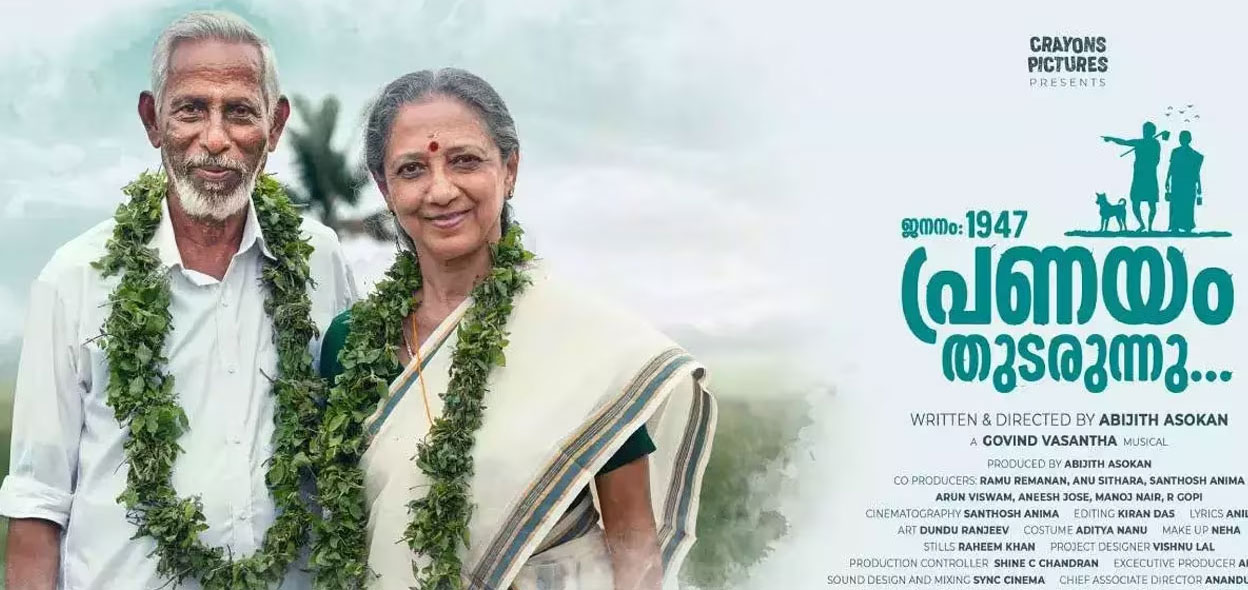
Jananam: 1947 Pranayam Thudarunnu Movie Review
Jananam: 1947 Pranayam Thudarunnu: Adorable film redefines love in the time of autumn years
Innocence is the hallmark of this moving film that redefines love during the autumn years of individuals who struggle to cope with alienation. Ramped up by compelling performances, it also points to the disintegration of blood relationships in the modern age.Alienation becomes a trauma when there is little hope for reunion with dear ones. Deserted by their children, the protagonists in 'Jananam: 1947 Pranayam Thudarunnu' realize this harsh truth and instead of falling into the morass of emotional depression, they try to revive life during their autumn years. Debutante writer-director Abijith Asokan, who is also one of the producers of this movie, explores how they desperately seek the soul of love in their latter part of life. Without overtures of dramatic treatment, Asokan presents a delicate and organic tale set in a village reflecting on the current realities of senility.
The protagonists ---Shivan and Gowri Teacher--- are withered by their senility but have a strong desire to bounce back in life defying their present situation; though they confess themselves that only a few more years are left for them. Gowri Teacher, played by Leela Samson, is an inmate of an old age home. She wants to get rid of the place and wishes to stay with the family of his only son Vivek, essayed by Deepak Parambol. But from his facial expression to Gowri's request, one can easily assume the domination of his wife over his life. Shivan, fabulously played by Jayaraj Kozhikode, is the helper in the old age home managed by Angel (Anu Sithara).
Realizing Gowri's longing for leading a homely life, Shivan invites her to his small house situated in the middle of a paddy field. But Gowri takes his casual humour seriously and decides to marry him to live in his house. Their relationship also unveils their persisting love for their deceased life partners as they quite often wistfully recall their good moments with them. Besides, both of them realize new meanings to their relationship which is opposed by Vivek and Shivan's younger son. Their unquenched thirst for life and deep bonding create surprise for people in the village.
In one of the scenes, when his friend asks him about his birth date, Shivan recalls his mother's remarks and replies that he was born when India got independence. It is ironic that when Shivan ties the knot for the second time, his young friend Sudhi (Noby Marcose) is desperately trying to get hitched. Jayaraj Kozhikode's stellar portrayal of the innocent villager adds a lot of sheen to 'Jananam: 1947 Pranayam Thudarunnu.' Shivan is scared of darkness and he wants somebody to accompany him while going out of the house at night. The actor has extremely maintained the natural mien required by the character with simplicity and sense of humour of an ordinary countryman.
Leela Samson is impressive while exuding the dismay and pain of motherhood when her son refuses to take her with him. The realistic and unique combination of Jayaraj and Leela as lead characters makes the movie poignant. The couple's love burgeons along with their relationship and in contrast, Shivan's friend, who is also his neighbour, is suspected of infidelity by his wife. The film also explores the negligence of filial duties by children towards their parents. The scene where ailing Shivan is 'dumped' at the bus stop by his son after getting his father's signature for a document in favour of him is so eloquent about the ingratitude of children.
Santhosh Anima's visuals beautifully elevate the ambience of 'Jananam: 1947 Pranayam Thudarunnu' and Kiran Das has done a commendable job by pruning the proceedings effectively to make the tale intense. Indeed, innocence is the hallmark of this moving film that redefines love during the autumn years of individuals who struggle to cope with alienation. They lead a romantic life by redefining love and finding different layers of it while living together under one roof. In fact, the old people snuff out the barriers of caste and status during their autumn days realizing the real essence of life. This adorable film, ramped up by compelling performances, also points to the disintegration of modern familial life set up.



















